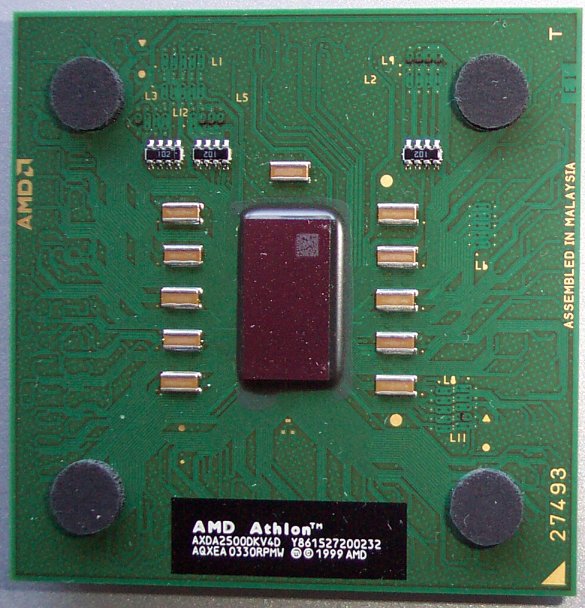A closer look

CPU City, buoyed by the considerable success of its XP1700 JIUHB line of CPUs, reckoned that the AQXEA Barton XP2500+ was almost as good value as the JIUHB, especially if your emphasis was geared towards achieving sky-high overclocks with a minimal financial outlay. Here the DKV4D codes on the identification sticker denoted that it was an OPGA (Organic Pin Grid Array) packaged CPU with a 1.65v operating voltage. It also supported a maximum sustainable temperature of 85c and it carried 512KB of L2 cache. Lastly, it ran off a 333MHz system bus. How can we discern all these meaningful characteristics from just 4 letters and a number ?. Simply just look at AMD's processor recognition file, located here.
Unlike the JIUHB XP1700, these numbers don't seem to indicate that this sample CPU has the cast-iron ability to run at inflated clock speeds. If AMD's own information codes don't give one an insight into a CPU's potential, another method is to peruse forums and databases with the aim of finding the stepping that does best. In view of this, this sample's recent manufacturing date (week 30, 2003) and the much-vaunted AQXEA stepping has proved to be hits with enthusiasts, who have claimed possible XP3200 speeds with AQXEA Barton XP2500+s. The key, it seems, was to specify this exact stepping, something that most on-line retailers aren't interested in providing. CPU City, though, do appear to guarantee it.
The reason for all this preamble boils down to the simple fact that we received numerous e-mails requesting information on the very best price-to-performance XP CPUs; overclocking on a shoestring, if you will. We'd been witness to some extraordinary speeds from an XP1700, so it was now a Barton's turn to strut its overclocking stuff. Could this AQXEA Barton XP2500+ really be as good as many had said. We were eager to find out. Before we do, we'll just reiterate the CPU's specifications.
Athlon
XP model number: 2500+
Cache Size: L1 - 128KB and L2 - 512KB = 640KB Total Cache
Frequency / Bus / Multiplier: 1.83GHz / 333FSB / 11.0x multiplier
Infrastructure Support: Socket A motherboards
Process Technology: 0.13-micron copper process technology
Die Size: 101mm²
Approximate Transistor count: 54.3 million
Nominal Voltage: 1.65V
Max Die Temp: 85 degrees Celsius
Typical Thermal Power: 53.7 W
Max Thermal Power: 68.3 W
Icc Typical (low power state): 7.2 A
Icc Typical (working state): 41.4 A
Icc (processor current) typical: 32.5 A
It's got a lot of transistors, and it's rather good at e-mailing and mIRC.









